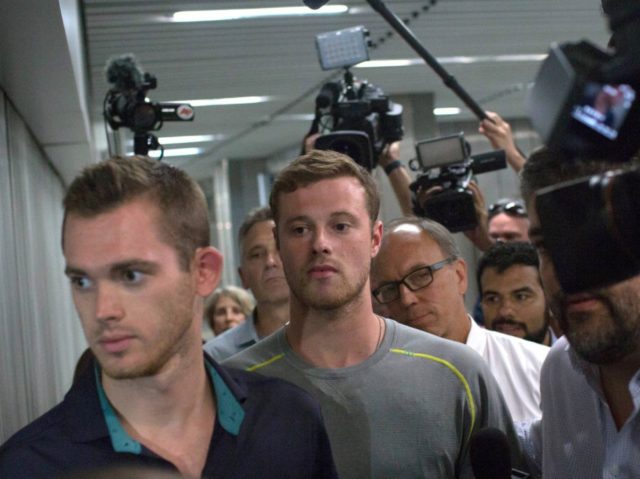Rio de Janeiro police have agreed to let U.S. Olympic swimmer James Feigen return home if he pays $11,000 to a charity of the city’s choice, following an incident in which Feigen and teammates Ryan Lochte, Gunnar Bentz, and Jack Conger were forced to pay gas station attendants money for damage at gunpoint.
The Brazilian government ordered the four swimmers to have their passports seized earlier this week, following the discovery of discrepancies in the details of the testimonies of Feigen and Lochte. Lochte by then had already left the country.
Late Sunday morning, the swimmers were involved in an altercation at a gas station in Rio de Janeiro that culminated in local security pulling guns on them and asking for money for damages. Lochte reportedly tore down an advertising sign, while a number of the swimmers urinated on gas station property. The men all acknowledged being inebriated during the affair and struggled to communicate with gas station security, who did not speak English.
Brazilian police officials have called the men liars for claiming that they were held up at gunpoint. Authorities agreed to let the three remaining swimmers leave the country on the condition that Feigen pay them a fee.
The Washington Post cites Feigen’s attorney, Breno Melaragno, as stating that Feigen is being made to “donate” $10,800 to a charity of the government’s choice.
Sérgio Riera, the attorney representing Bentz and Conger, told the newspaper his clients will be allowed to leave the country without paying the government because they never gave a public testimony. “They did not lie. They did not talk to the press, not one lie and not one truth. They simply did not talk to the press,” Riera said. He added that the men later told police that Lochte’s account of the proceedings was untrue. Riera goes on to corroborate most of Lochte’s story, however:
Then Ryan began to argue, said, ‘I did nothing wrong’, and they made them sit on the ground with the firearm pointing to them. And a customer appeared who spoke English because the security did not speak English…
Imagine what the conversation must have been like. A firearm, one talking Portuguese. the others talking English, totally frenetic, drunk and they came to an agreement to pay the damage. They gave a $20 note and 100 reals, and got another taxi and went away.
Compare to Lochte’s original media statement, in which he also noted that he did not remember all the facts clearly due to his inebriated state:
We got pulled over in our taxi and these guys came out with a badge, a police badge. No lights, no nothing, just a police badge. The guy pulled out his gun, he cocked it, put it to my forehead and said ‘get down.’ I was like [puts hands up] I put my hands up. I was like ‘whatever.’ He took our money, he took my wallet.
Gas station security did have badges to give criminals the appearance of law enforcement. The security officials drew their guns after calling Rio police, who never responded.
Rio police chief Fernando Veloso nevertheless reiterated Friday, “no robbery was committed against these athletes. They were not victims of the crimes they claimed.” The United States Olympic Committee (USOC) has issued a formal apology as demanded by the Brazilian government to withdraw their indictment of Feigen and Lochte. Feigen has personally apologized for the “inconvenience” caused to Rio de Janeiro, and Lochte issued a statement apologizing Friday morning:
It’s traumatic to be out late with your friends in a foreign country – with a language barrier – and have a stranger point a gun at you and demand money to let you leave, but regardless of the behavior of anyone else that night, I should have been much more responsible in how I handled myself and for that I am sorry to my teammates, my fans, my fellow competitors, my sponsors, and the hosts of this great event.
Both the Brazilian authorities and Olympic officials have been derisive in their remarks regarding the incident. Mario Andrada, a spokesman for the International Olympic Committee (IOC), referred to the swimmers as “kids” during a press conference, suggesting Brazilian officials should not charge them with a crime for having guns pulled on them. Before police accused Lochte of lying, Brazil’s Minister of Sports asserted that, if a robbery occurred, it was because the swimmers were out at an “inappropriate” time, not because Rio de Janeiro is a city struggling with a surging violent crime rate.

COMMENTS
Please let us know if you're having issues with commenting.